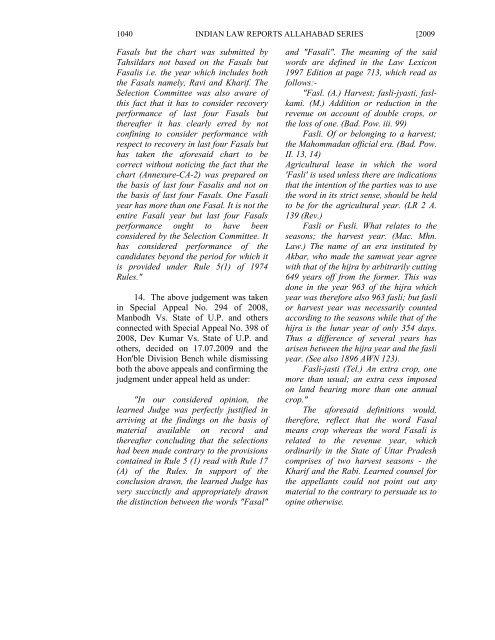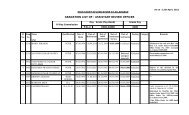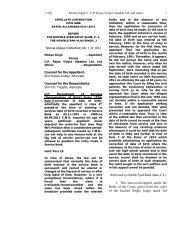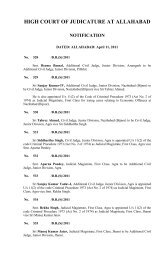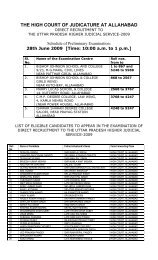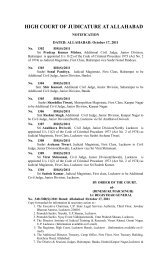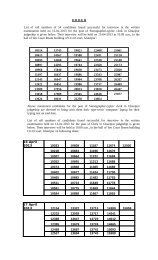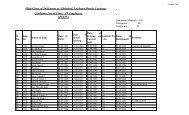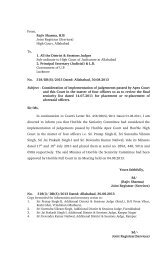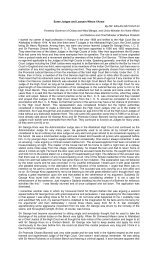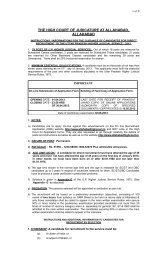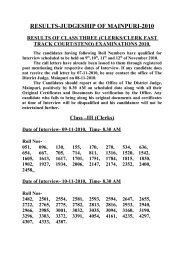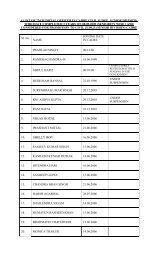Nov - High Court of Judicature at Allahabad
Nov - High Court of Judicature at Allahabad
Nov - High Court of Judicature at Allahabad
You also want an ePaper? Increase the reach of your titles
YUMPU automatically turns print PDFs into web optimized ePapers that Google loves.
1040 INDIAN LAW REPORTS ALLAHABAD SERIES [2009<br />
Fasals but the chart was submitted by<br />
Tahsildars not based on the Fasals but<br />
Fasalis i.e. the year which includes both<br />
the Fasals namely, Ravi and Kharif. The<br />
Selection Committee was also aware <strong>of</strong><br />
this fact th<strong>at</strong> it has to consider recovery<br />
performance <strong>of</strong> last four Fasals but<br />
thereafter it has clearly erred by not<br />
confining to consider performance with<br />
respect to recovery in last four Fasals but<br />
has taken the aforesaid chart to be<br />
correct without noticing the fact th<strong>at</strong> the<br />
chart (Annexure-CA-2) was prepared on<br />
the basis <strong>of</strong> last four Fasalis and not on<br />
the basis <strong>of</strong> last four Fasals. One Fasali<br />
year has more than one Fasal. It is not the<br />
entire Fasali year but last four Fasals<br />
performance ought to have been<br />
considered by the Selection Committee. It<br />
has considered performance <strong>of</strong> the<br />
candid<strong>at</strong>es beyond the period for which it<br />
is provided under Rule 5(1) <strong>of</strong> 1974<br />
Rules."<br />
14. The above judgement was taken<br />
in Special Appeal No. 294 <strong>of</strong> 2008,<br />
Manbodh Vs. St<strong>at</strong>e <strong>of</strong> U.P. and others<br />
connected with Special Appeal No. 398 <strong>of</strong><br />
2008, Dev Kumar Vs. St<strong>at</strong>e <strong>of</strong> U.P. and<br />
others, decided on 17.07.2009 and the<br />
Hon'ble Division Bench while dismissing<br />
both the above appeals and confirming the<br />
judgment under appeal held as under:<br />
"In our considered opinion, the<br />
learned Judge was perfectly justified in<br />
arriving <strong>at</strong> the findings on the basis <strong>of</strong><br />
m<strong>at</strong>erial available on record and<br />
thereafter concluding th<strong>at</strong> the selections<br />
had been made contrary to the provisions<br />
contained in Rule 5 (1) read with Rule 17<br />
(A) <strong>of</strong> the Rules. In support <strong>of</strong> the<br />
conclusion drawn, the learned Judge has<br />
very succinctly and appropri<strong>at</strong>ely drawn<br />
the distinction between the words "Fasal"<br />
and "Fasali". The meaning <strong>of</strong> the said<br />
words are defined in the Law Lexicon<br />
1997 Edition <strong>at</strong> page 713, which read as<br />
follows:-<br />
"Fasl. (A.) Harvest; fasli-jyasti, faslkami.<br />
(M.) Addition or reduction in the<br />
revenue on account <strong>of</strong> double crops, or<br />
the loss <strong>of</strong> one. (Bad. Pow. iii. 99)<br />
Fasli. Of or belonging to a harvest;<br />
the Mahommadan <strong>of</strong>ficial era. (Bad. Pow.<br />
II. 13, 14)<br />
Agricultural lease in which the word<br />
'Fasli' is used unless there are indic<strong>at</strong>ions<br />
th<strong>at</strong> the intention <strong>of</strong> the parties was to use<br />
the word in its strict sense, should be held<br />
to be for the agricultural year. (LR 2 A.<br />
139 (Rev.)<br />
Fasli or Fusli. Wh<strong>at</strong> rel<strong>at</strong>es to the<br />
seasons; the harvest year. (Mac. Mhn.<br />
Law.) The name <strong>of</strong> an era instituted by<br />
Akbar, who made the samw<strong>at</strong> year agree<br />
with th<strong>at</strong> <strong>of</strong> the hijra by arbitrarily cutting<br />
649 years <strong>of</strong>f from the former. This was<br />
done in the year 963 <strong>of</strong> the hijra which<br />
year was therefore also 963 fasli; but fasli<br />
or harvest year was necessarily counted<br />
according to the seasons while th<strong>at</strong> <strong>of</strong> the<br />
hijra is the lunar year <strong>of</strong> only 354 days.<br />
Thus a difference <strong>of</strong> several years has<br />
arisen between the hijra year and the fasli<br />
year. (See also 1896 AWN 123).<br />
Fasli-jasti (Tel.) An extra crop, one<br />
more than usual; an extra cess imposed<br />
on land bearing more than one annual<br />
crop."<br />
The aforesaid definitions would,<br />
therefore, reflect th<strong>at</strong> the word Fasal<br />
means crop whereas the word Fasali is<br />
rel<strong>at</strong>ed to the revenue year, which<br />
ordinarily in the St<strong>at</strong>e <strong>of</strong> Uttar Pradesh<br />
comprises <strong>of</strong> two harvest seasons - the<br />
Kharif and the Rabi. Learned counsel for<br />
the appellants could not point out any<br />
m<strong>at</strong>erial to the contrary to persuade us to<br />
opine otherwise.


